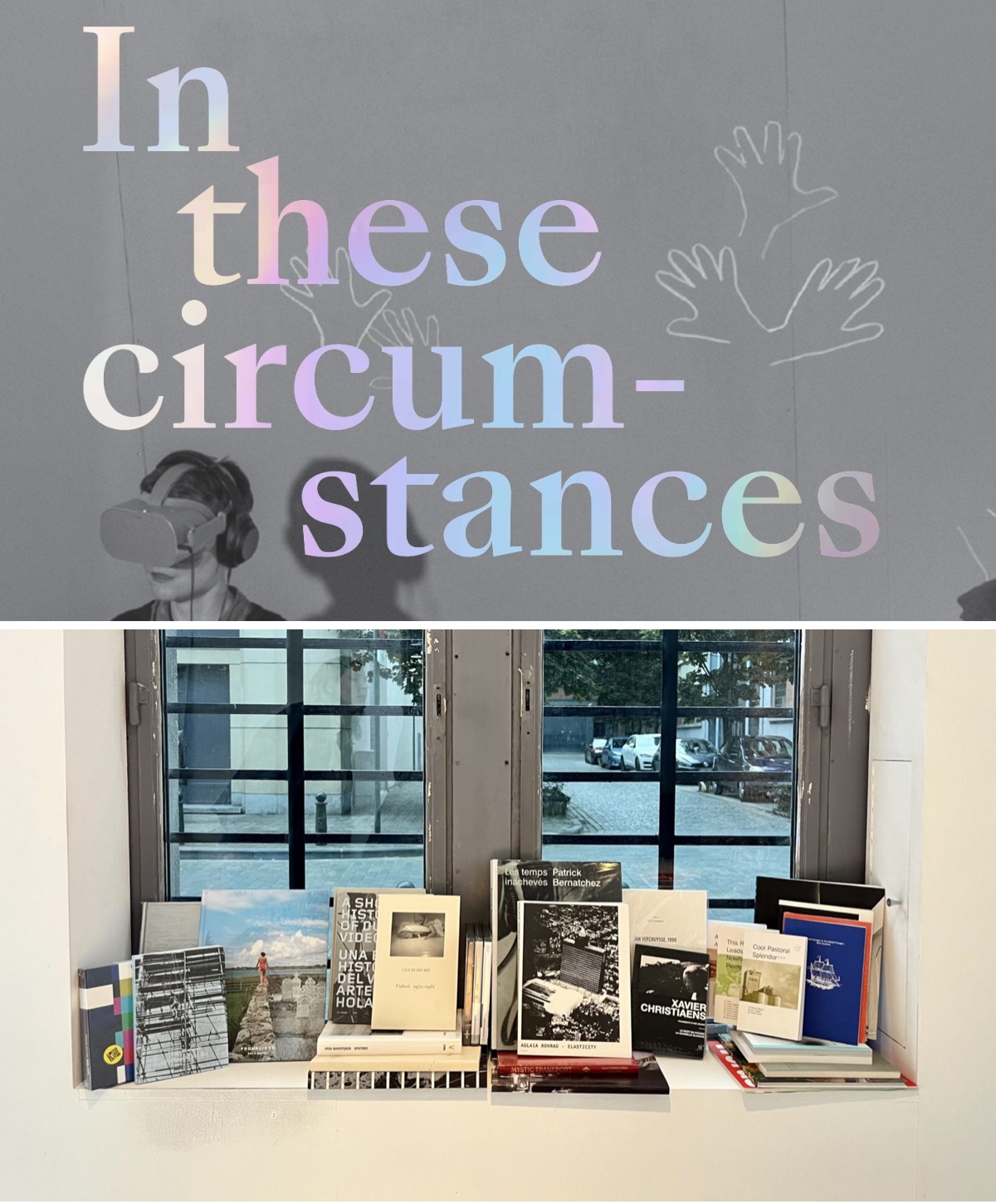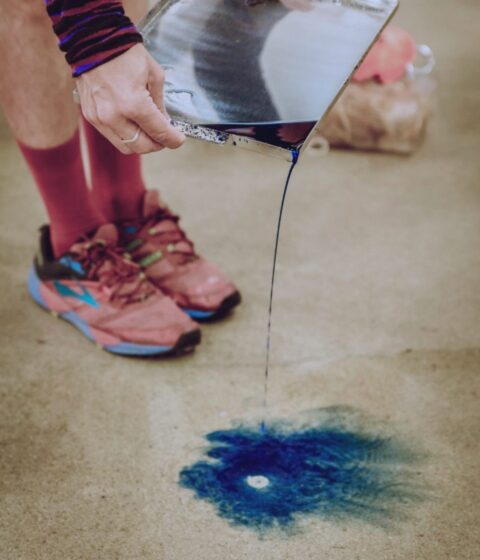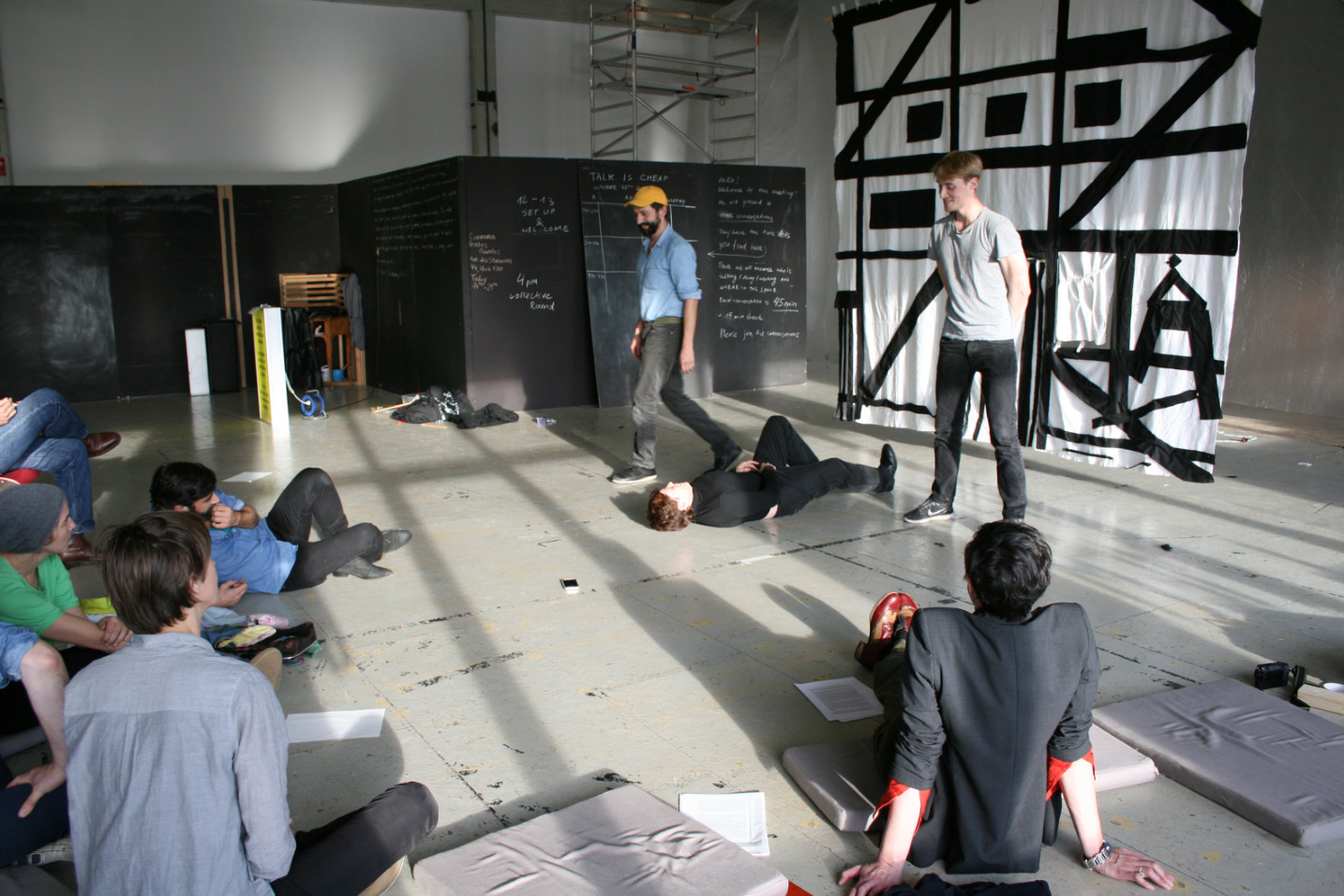information, lecture, research center, seminar, workshop
COLLECTIVE LEARNING
29 June 2025 / La Bodega, Birminghamstraat 30, 1080 Molenbeek
a transmission moment with One Field Fallow & Topote de Acahual
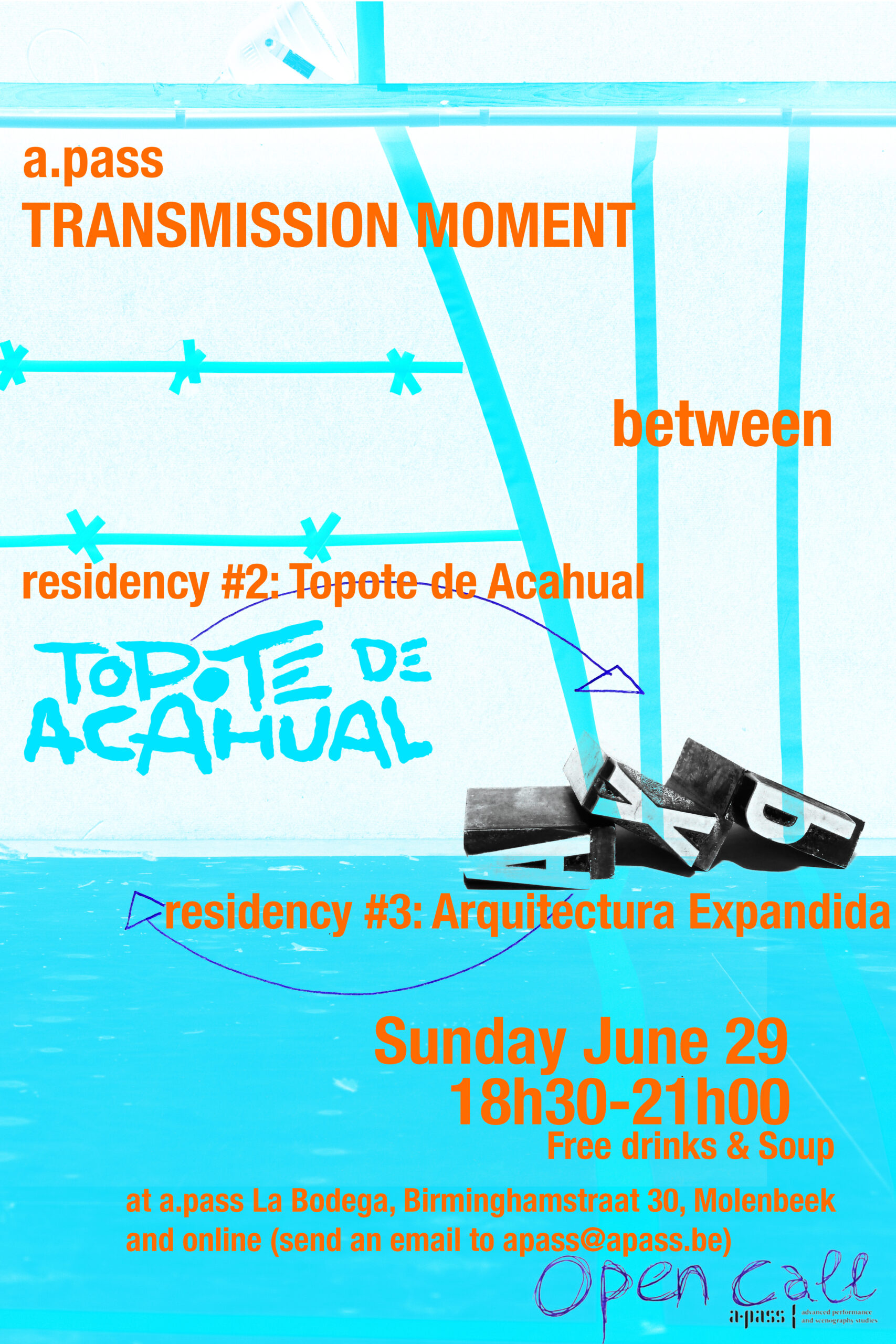
Transistion #2
COLLECTIVE LEARNING
a transmission moment with Topote de Acahual & Arquitectura Expandida
Sunday June 29th – 18h30-21h00
FREE SOUP & DRINKS
>>> a.pass new space: La Bodega, Birminghamstraat 30, 1080 Molenbeek
To share part of the research Topote de Acahual developed during the a.pass residency we organise a public transmission moment open to everyone and to invite Arquitectura Expandida, the third collective in the residency program, to be with us.
Read more..information, project
Summer Book Sale @ argos
21 June 2025 / werfstraat 13, 1000 Brussels
presentation of In These Circumstances
Staturday June 21st at argos – from 11h00 till 18h00
Werfstraat 13 Rue du Chantier, 1000 Brussels
Join us for a festive weekend at argos. Come for the books, the launch of a new publication by argos, a presentation of the a.pass publication IN THESE CIRCUMSTANCES or stay for the exhibition and screenings!
Highlights:
- Book sale (all weekend, 11:00-18:00): Discover hidden gems in our lobby—past argos publications and artist books from our media library.
- Publication launch (Saturday at 15:00): Presentation of the new argos publication reflecting on a chapter of organisational transition.
- Presentation of the a.pass publication In These Circumstances (Saturday 16:00) by Philippine Hoegen, Pia Louwerens, Túlio Rosa & others
- Video screening: Ongoing in the media annex(e) above the bar—a video essay by Leon Decock
Also on view: the Magical Realism exhibition in collaboration with WIELS and the related argos collection selects film programme.
more info: www.argosarts.org
information, lecture, research center, seminar, workshop
COLLECTIVE LEARNING
3 May 2025 / La Bodega, Birminghamstraat 30, 1080 Molenbeek
a transmission moment with One Field Fallow & Topote de Acahual
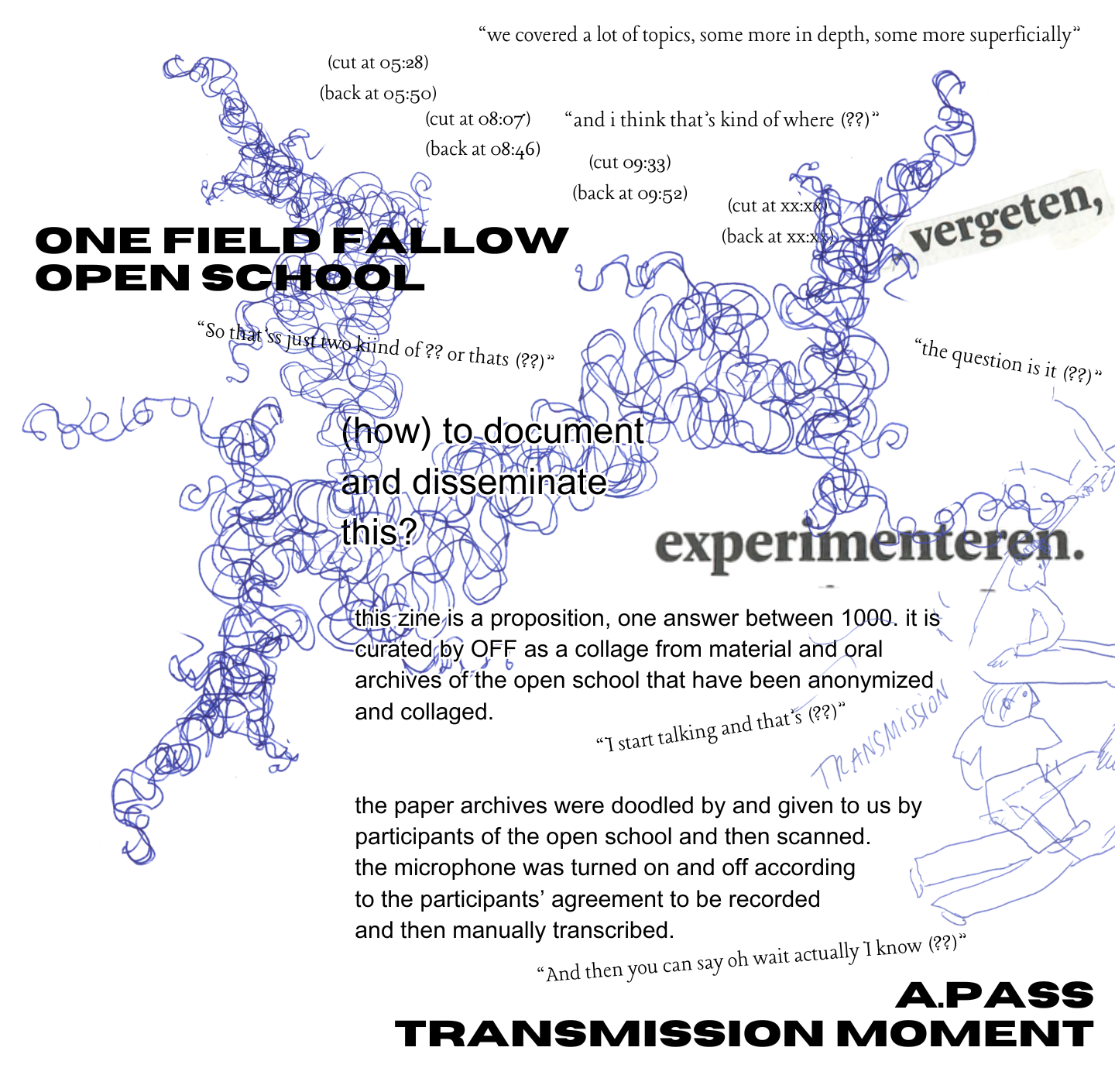
OFF transmission moment
COLLECTIVE LEARNING
a transmission moment with One Field Fallow & Topote de Acahual
Saturday May 3rd – 18h00-21h00
FREE SOUP & DRINKS
>>> a.pass new space: La Bodega, Birminghamstraat 30, 1080 Molenbeek
To share part of the research One Field Fallow developed during the a.pass residency we organise a public transmission moment open to everyone and to invite Topote de Acahual, the second collective in the residency program, to be with us.
Read more..information, project
BARULLO de HOJAS
17 April-1 May 2025 / Birminghamstraat 30
Study Group by Topote de Acahual
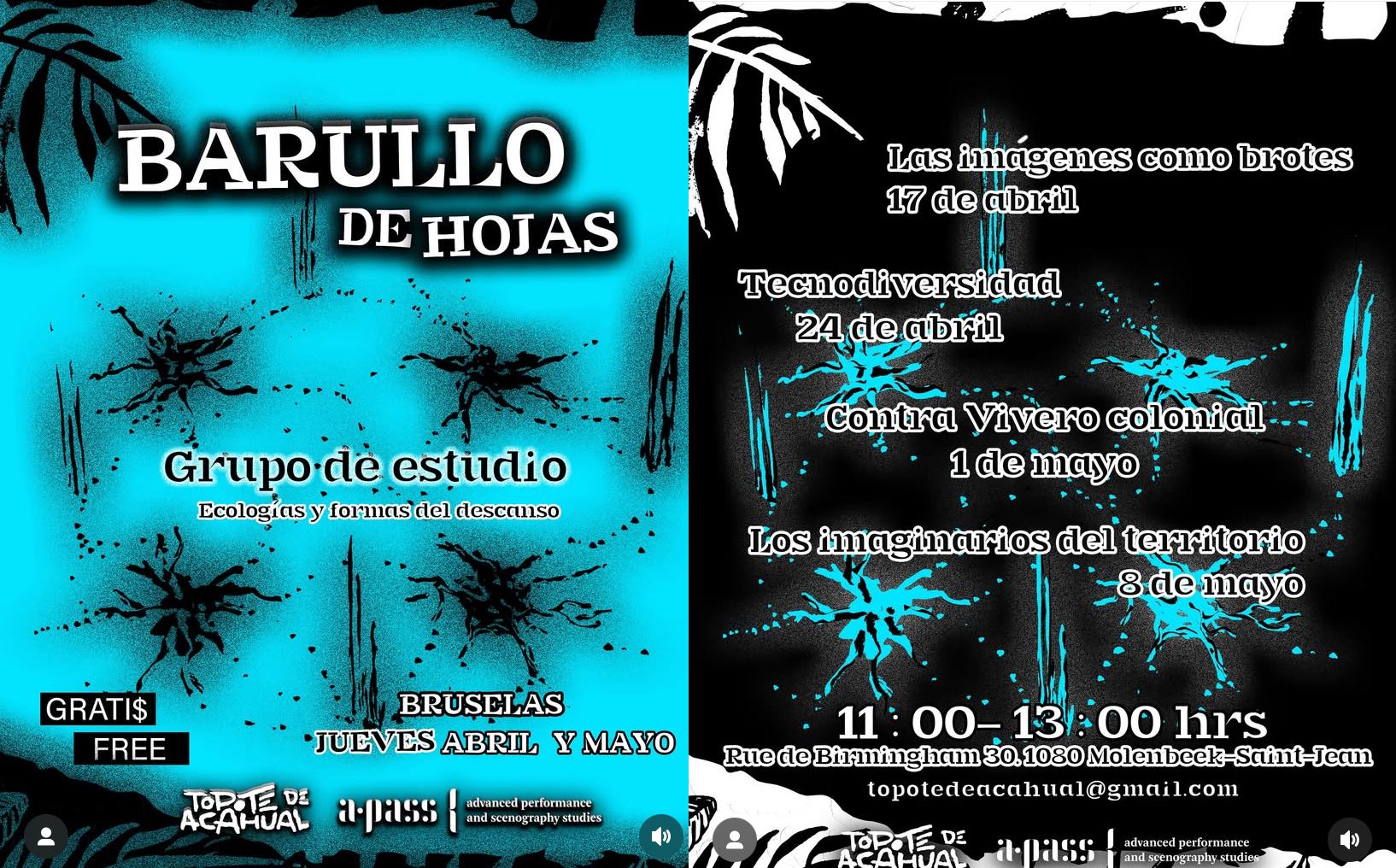
Barullo de Hojas
Coming 3 Thursdays April 17& 24 and May 1st – from 11h00 till 13h00
Rue Birminghamstraat 30, 1080 Molenbeek
– Thursday April 17
– Thursday April 24
– Thursday May 1
Let’s put a bunch of leafs together and shake them 🍂
Short texts for Spanish-speaking people in Brussels (but open to everyone) who are interested in talking about ecology and rest. There will be fresh water and hammocks.
Send an ‘🌱’ by email to topotedeacahual [AT] gmail.com and receive info & pdf’s
information, project
Spring Drink
21 March 2025
with a.pass and nadine
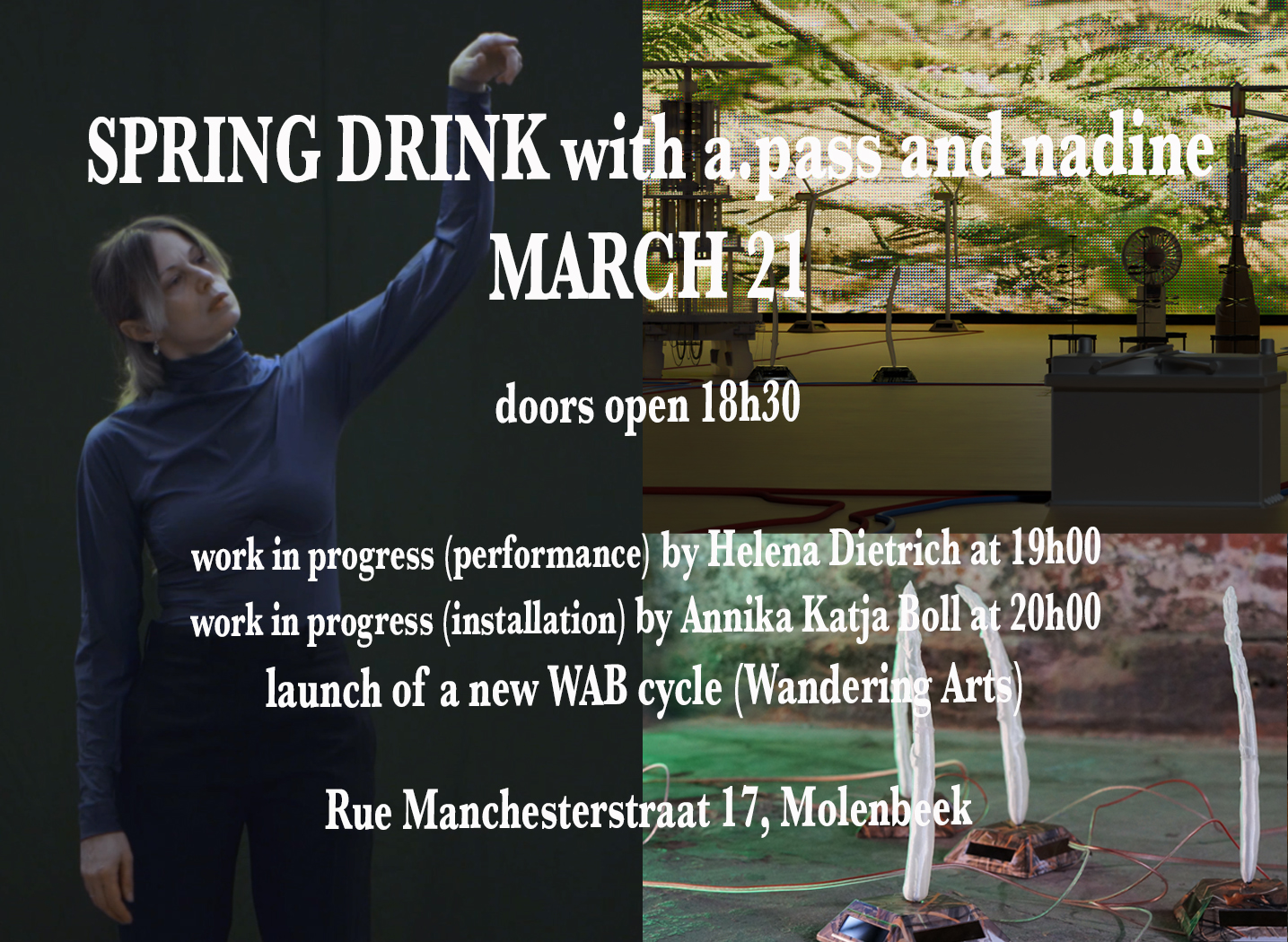
EVENT SPRING DRINK
March 21st at 18h30
rue de Manchesterstraat 17, Molenbeek
Let’s celebrate SPRING ! nadine and a.pass are very happy to invite you for another Spring Drink! This time our friends from nadine will launch a new cycle of WAB (Wandering Arts Bienniale) and they will celebrate with us the end of our time at Manchesterstraat 17.
PROGRAM
– 18:30: doors open
– 19:00: work in progress (performance) by Helena Dietrich
– 20:00: work in progress (installation) by Annika Katja Boll
– Launch of a new WAB cycle (Wandering Arts)
Read more..information
a.pass moved
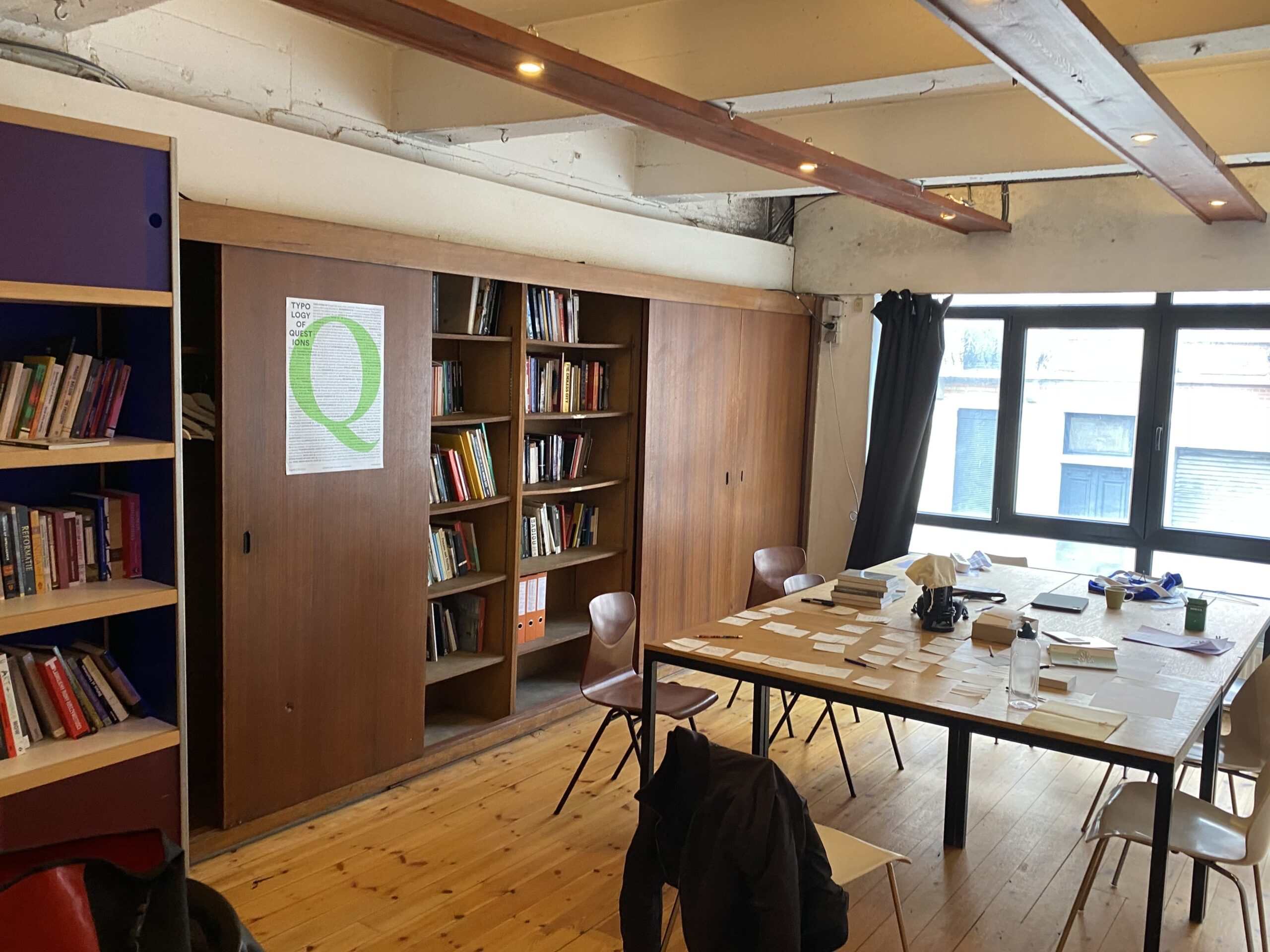
a.pass at La Bodega
From Manchester to Birmingham… but still in Molenbeek! a.pass is moving to a new location.
From Manchester to Birmingham… but still in Molenbeek! a.pass has moved to a new location, from now on a.pass resides at La Bodega, Birminghamstraat 30, 1080 Molenbeek! We share the building with some other art organisations (Habemus Papam, Entropie Productions, Impulsion Dance, ABOUTT and some individual artists). Check out the new space during the events organised by our 2nd collective TOPOTE DE ACAHUAL, or explore the space during Kunstenfestivaldesarts in May.
- The a.pass archive is publicly available at AMVB.
-, information, lecture, performative publishing, research center
One Field Fallow OPEN SCHOOL
16 October-29 January 2025 / Onderrichtsstraat 60, 1000 Brussels
Open School III : Holding Space: In- and Exclusivity
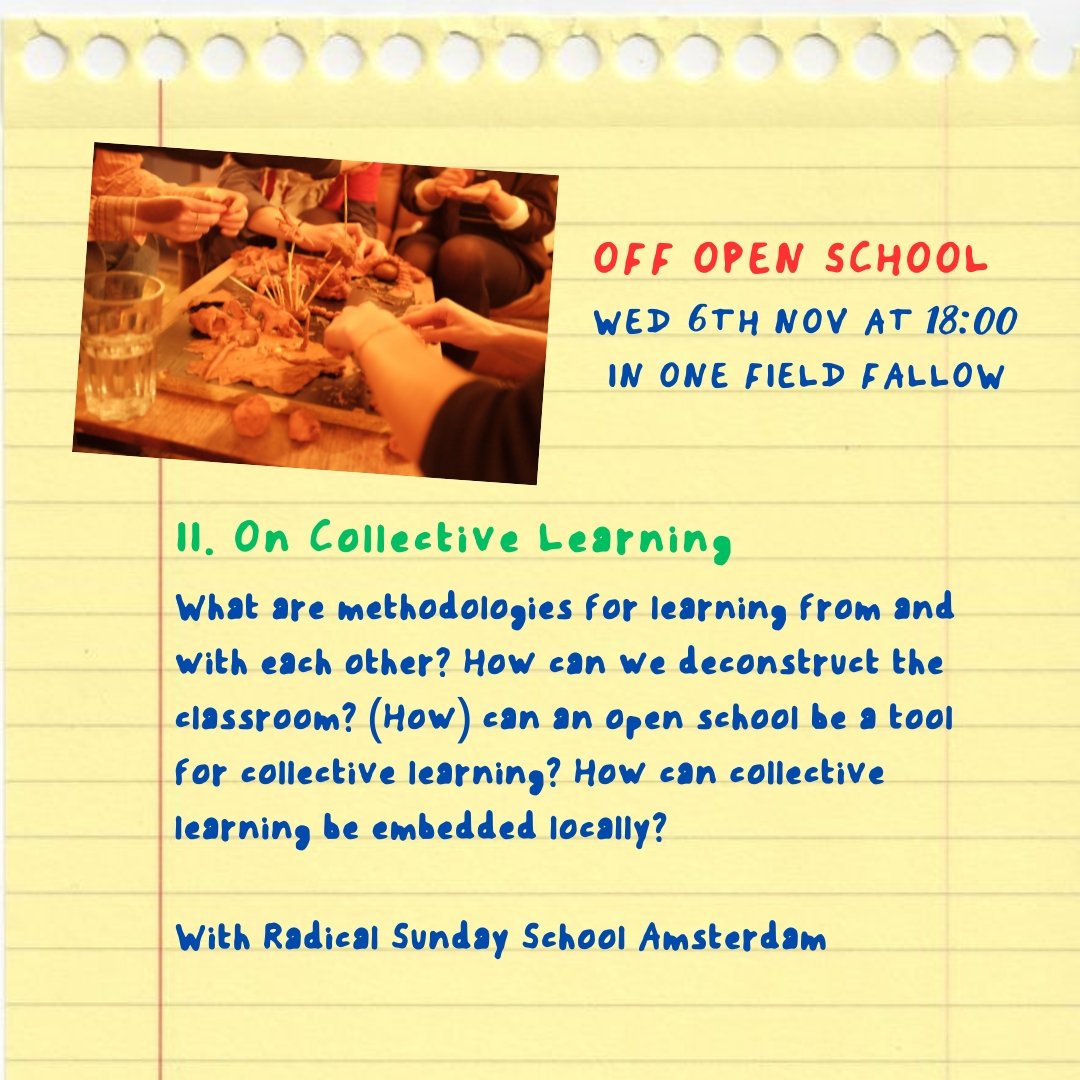
OFF-Open School-II
In the context of their Collective Research Residency, One Field Fallow introduces their OFF Open School – a series of five sessions diving into the internal questions they’ve been dealing with the past two years. For every Open School, they will dive into one topic. Each time another collectove is invited to bring material to the conversation. Every Open School will be a dialogue between OFF, the invited collective and the audience.
Read more..information, performative publishing, project, workshop
AM I EVIL ? – Brussels Edition
19 October 2024 / rue Manchesterstraat 17, Molenbeek
Public sharing moment
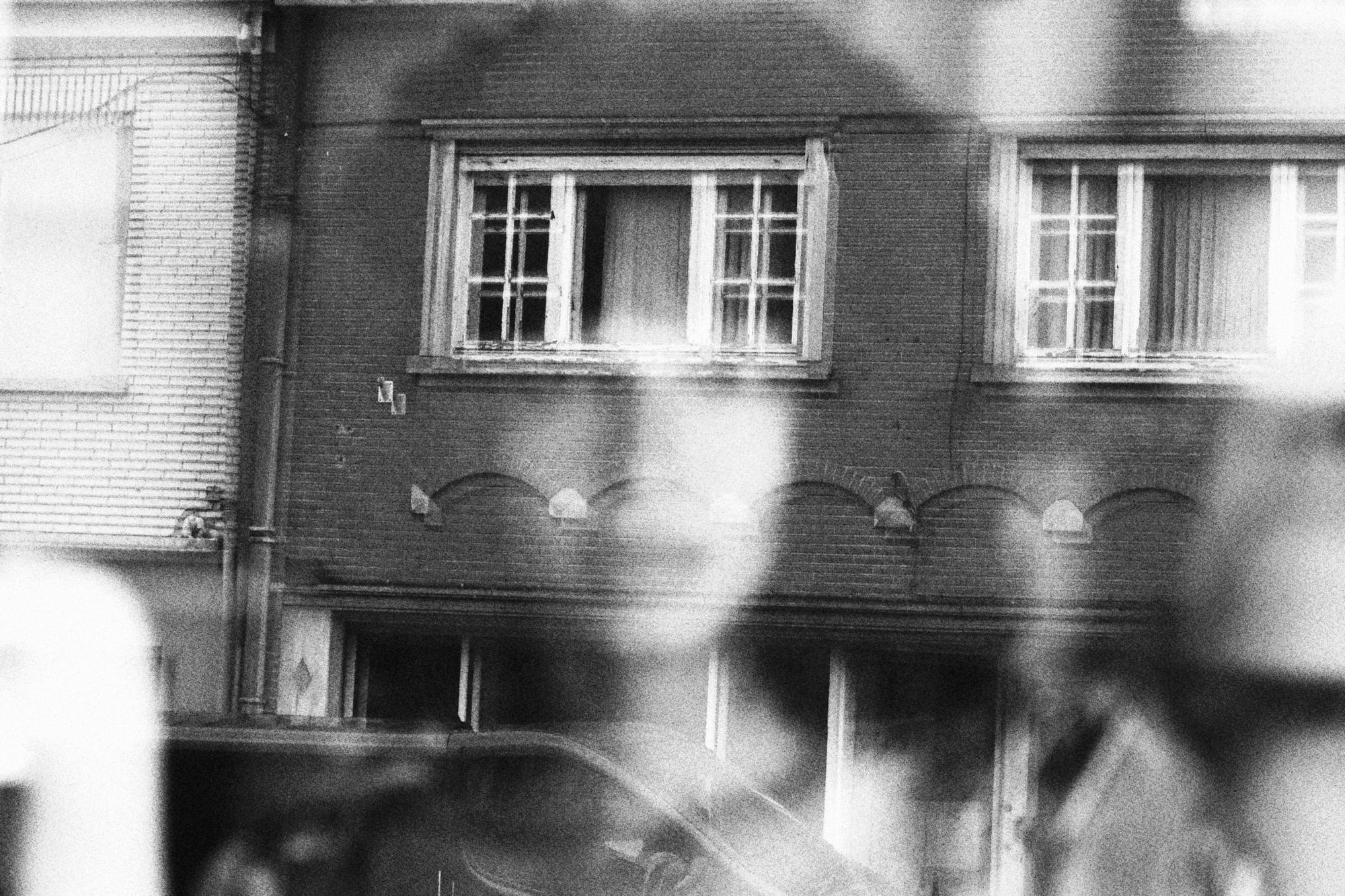
©Bilal Kamilla Arnout
Am I Evil?* Brussels Edition
by Simone Basani and Alice Ciresola with Els Moors
Public sharing moment on Saturday October 19 from 16:30 on
Can erotic writing become a place for decolonial and feminist exploration?How could one embrace the tools of erotic writing to unveil, investigate and question power processes of colonisation, discrimination, nanoracism, marginalization, exoticization, abuse and seduction from diverse perspectives?
These questions are at the core of Am I Evil? process writers of all sorts are invited to embark upon.
On this journey the group of writers embrace erotic writing as a tool to investigate their own desire, and how this relates to the Other and the Unknown.
Read more..information, performance, performative publishing
SUMMER DRINK
7 July 2024 / rue Manchesterstraat 17, Molenbeek
with a.pass and nadine
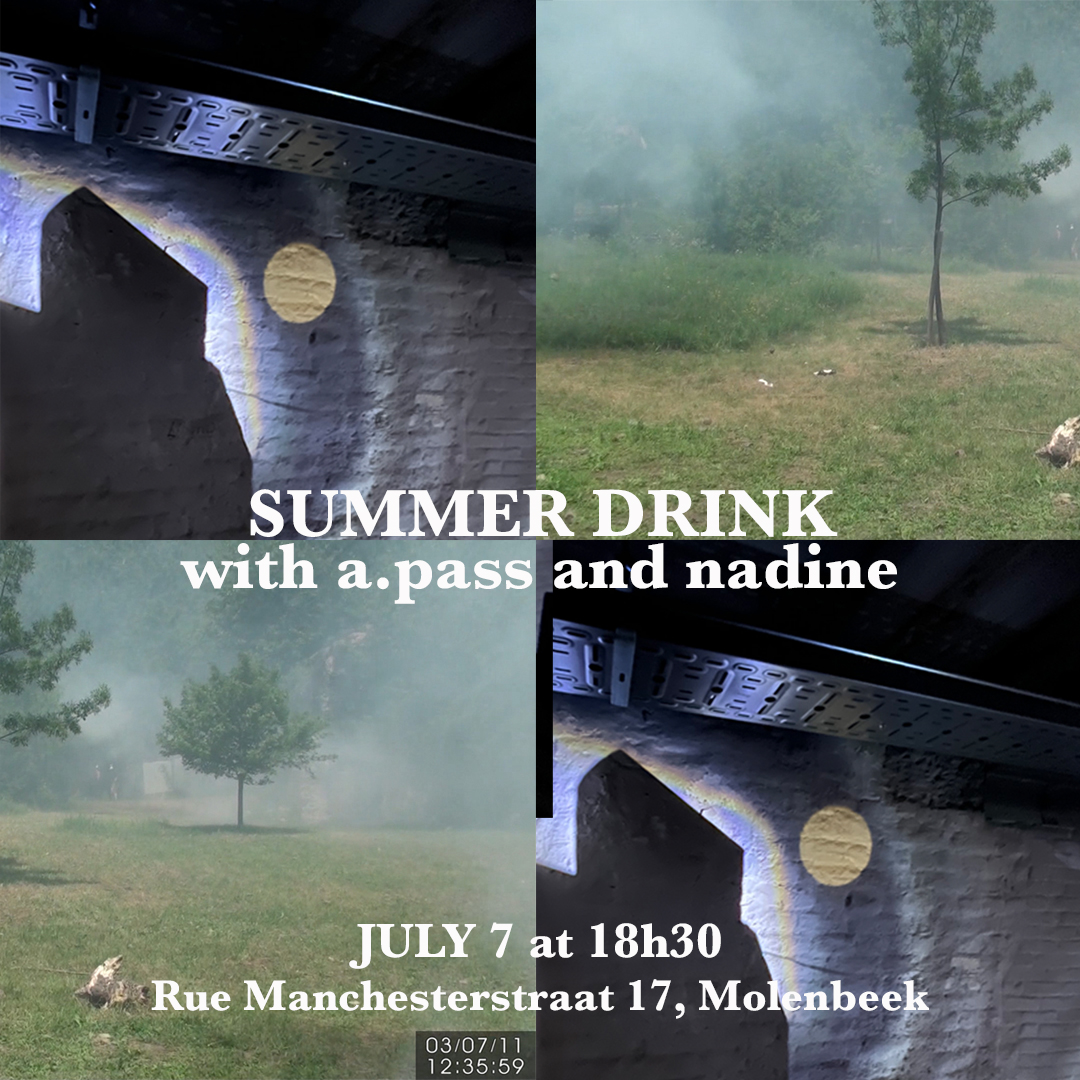
SUMMER Drink -01
work in progress by Diego Echegoyen (sound performance) & Davide Tidoni (film)
July 7 at 18h30
rue de Manchesterstraat 17, Molenbeek
Let’s celebrate SUMMER ! After the Spring Drink nadine and a.pass are very happy to invite you for their Summer Drink ! This time with work in progress (performance, sound and film) by Diego Echegoyen and Davide Tidoni.
Join us, together with our friends of nadine, for a free drink and 2 presentations!
PROGRAM:
– 18:30 – doors open + drink
– 19:00 – Invisible Cities by Diego Echegoyen
– 20:15 – The Birth of a Song/Come nasce una canzone by Davide Tidoni
Read more..information, project
Spring Drink & Films
9 April 2024
with a.pass and nadine
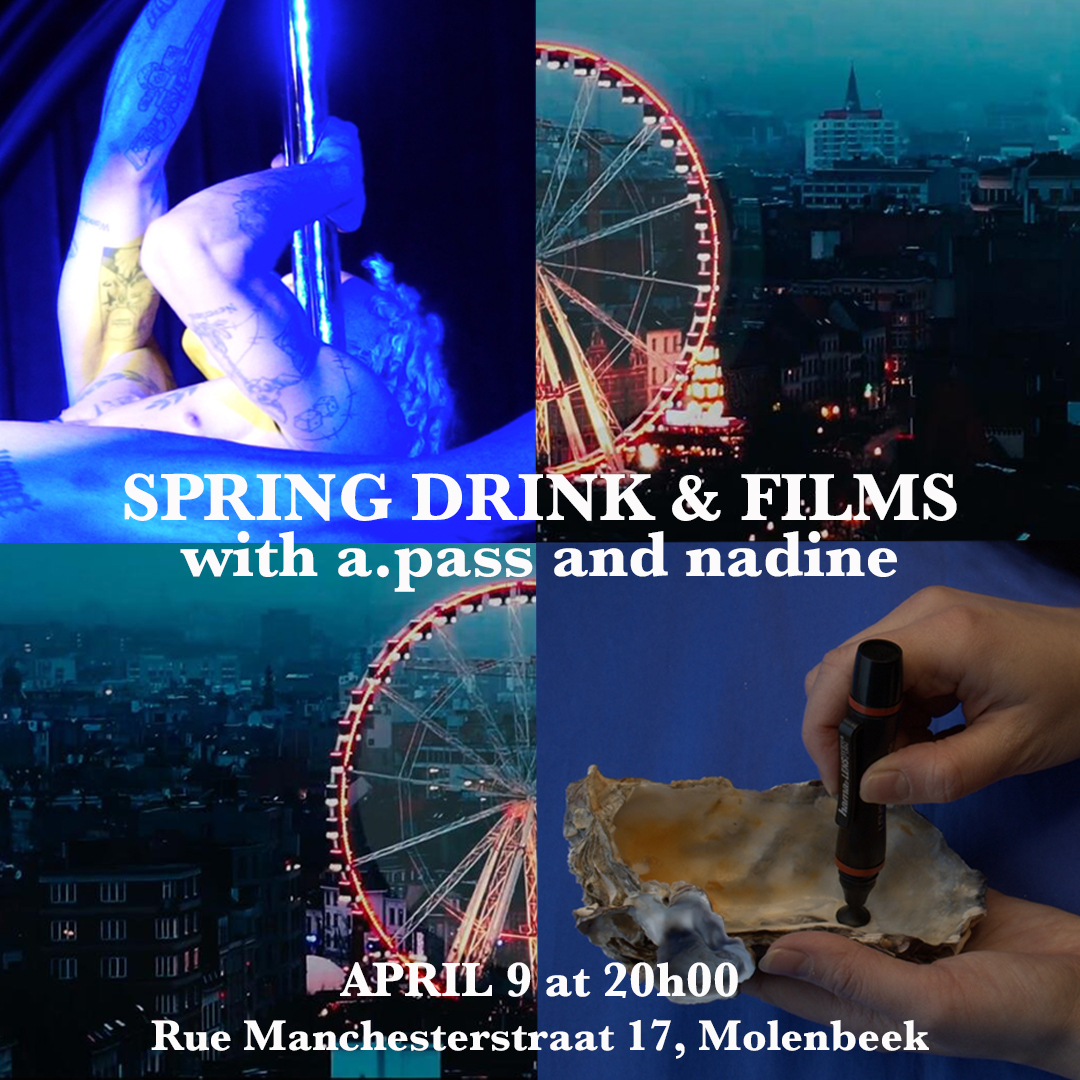
image by apass - ©Amari ©Shelbatra Jashari ©Anna Lugmeier
April 9 at 20h00
rue de Manchesterstraat 17, Molenbeek
Spring comes with a fresh new wind: a.pass installs a temporary place in Manchesterstraat 17, Molenbeek, where artists and alumni can organise gatherings and presentations in the coming months. For this spring event, a.pass invited nadine to host together an inauguration drink and an evening with screening of three short films by independent makers living in Brussels.
Join us, together with our friends of nadine, for a free drink and 3 short films!
FILM PROGRAM:
– Memories of a Camera Perspective by Anna Lugmeier
– Show Girl by Amari
– shemortelle by Shelbatra Jashari
Read more..information
The a.pass archive
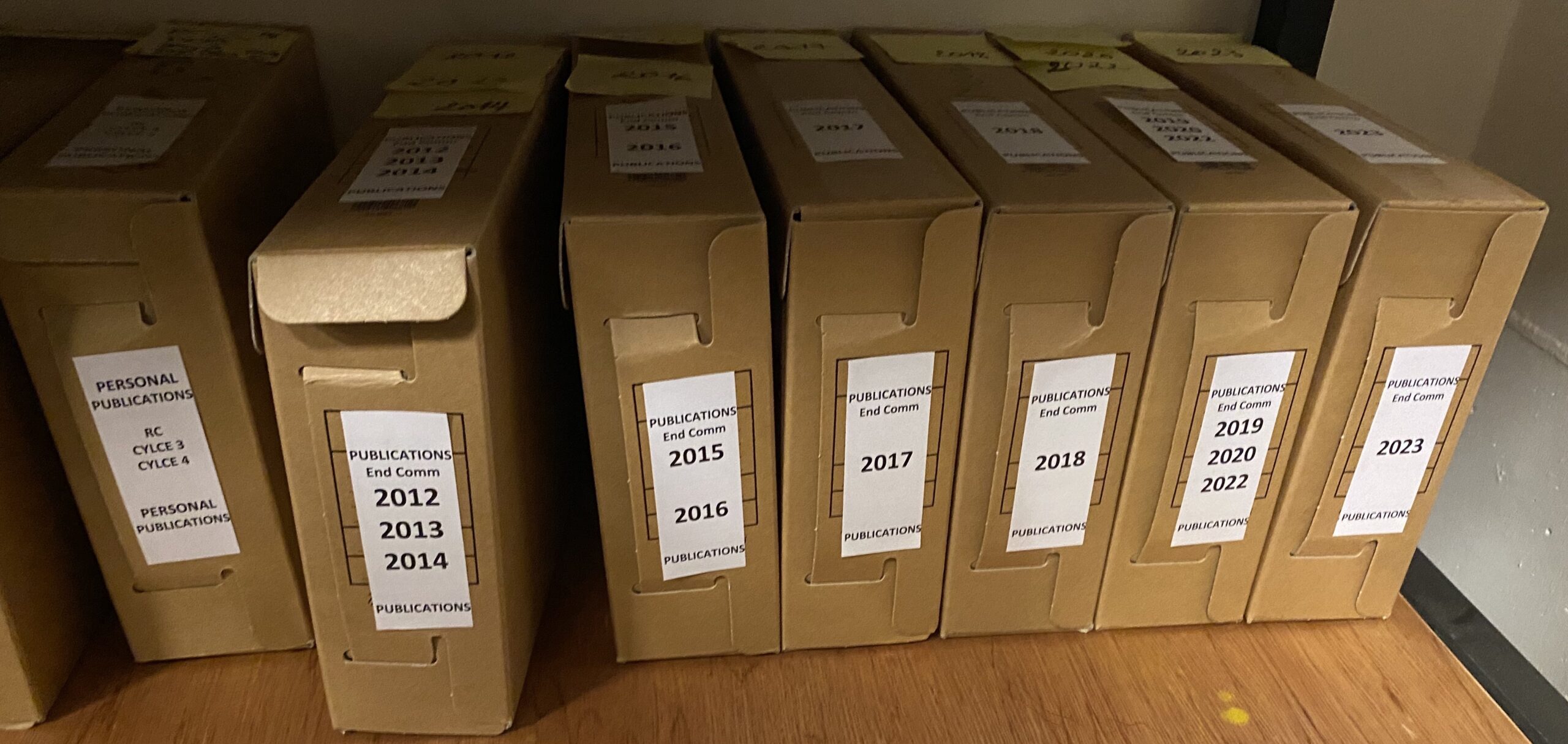
apass archive
From now on the a.pass archive is part of the AMVB collection, which has many archives by Flemish cultural institutions in Brussels in their collection. In this way the a.pass archive, with the many publications made during more then 14 years, will be publicly accessible and preserved for future generations.
You can find AMVB here: Arduinkaai 28, 1000 Brussels or www.amvb.be
information
Towards Apartheid Free Zones

©AFZ
On the 21st of March, the day of Spring and the International Day against racism a.pass joined the TOWARDS APARTHEID FREE ZONES – Cultural Solidarity with Palestine campaign. By doing this we want to express, as an organisation, once more our solidarity with Palestine. We say NO to any form of discrimination, racism, violence and violation of human rights and international law. We say NO to anti-semitism, we say NO to islamophobia. And we say NO to any form of terrorism, including organised state terror like apartheid.
Read more..information, performative publishing, project, workshop
AM I EVIL ?
Open Call for writers
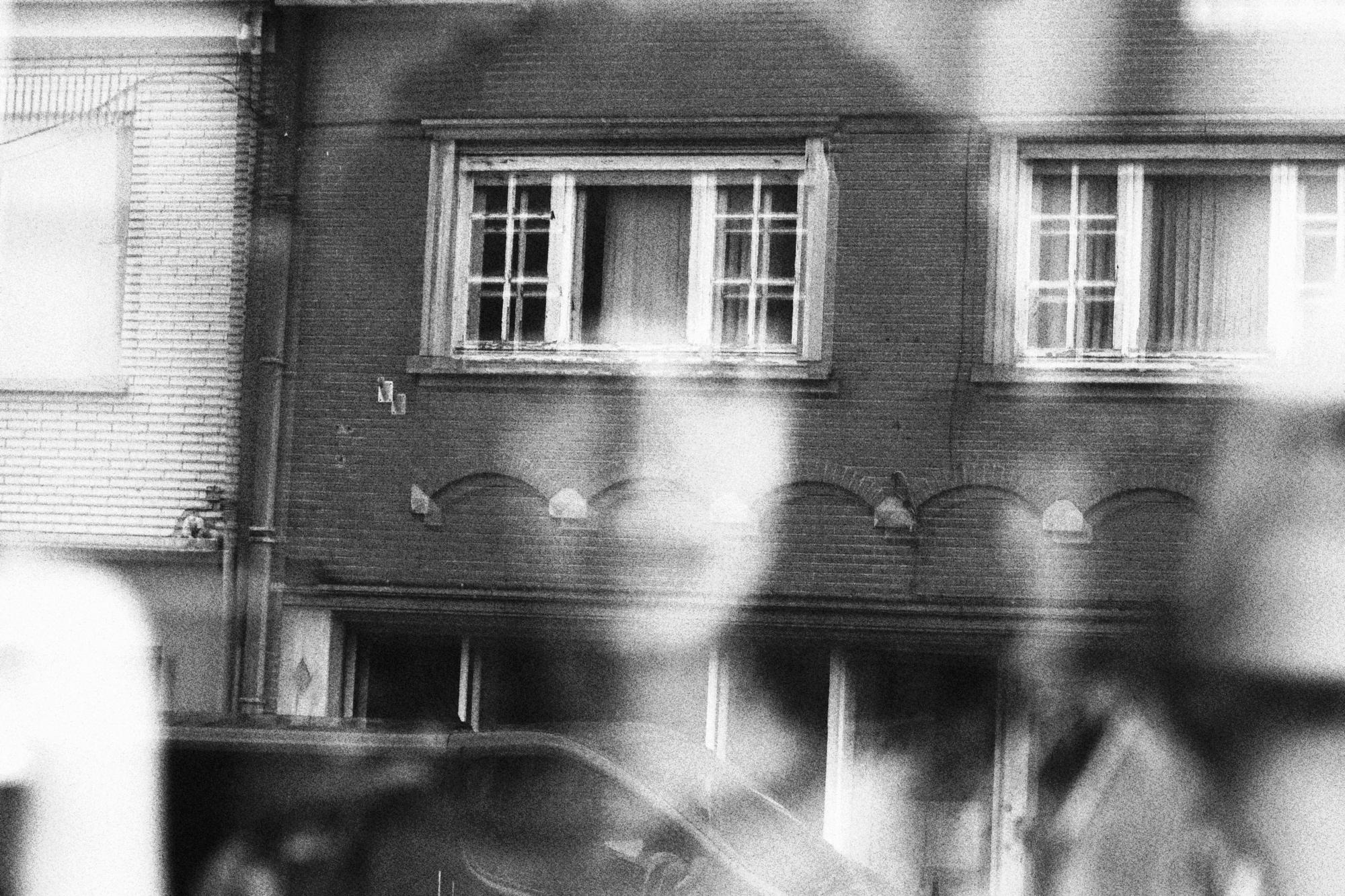
©Bilal Kamilla Arnout
Am I Evil?* Brussels Edition
by Simone Basani and Alice Ciresola with Els Moors
Can erotic writing become a place for decolonial and feminist exploration?How could one embrace the tools of erotic writing to unveil, investigate and question power processes of colonisation, discrimination, nanoracism, marginalization, exoticization, abuse and seduction from diverse perspectives?
These questions are at the core of Am I Evil? process writers of all sorts are invited to embark upon.
On this journey the group of writers embrace erotic writing as a tool to investigate their own desire, and how this relates to the Other and the Unknown.
For the duration of the whole journey they stay in dialogue through a peer-to-peer editing methodology. Actually such a methodology is not ‘just’ editing. It is rather an intimate and radical way of dialoguing through re-writing.
Am I Evil? starts off with a-lecture introduction by Basani and Ciresola open to everyone about the legacy of Jeanne Walschot, the first white female dealer and collector of African art we know, active in Brussels from 1920s.
Read more..information
research center
AAA
Due to the decision by the Ministry of Education to stop their financial support of a.pass, both programs (the Postgraduate as well as the Research Center) came to an end in 2023.
Until the end of 2023 a.pass offered a one-year program for the development of artistic research projects on a post-graduate level in a critical and collaborative environment.
The Research Center at a.pass was a platform for advanced research practices in the arts. It invited five to six associated researchers per one year cycle to develop their artistic research practice in a environment of mutual criticality and institutional support. In agreement with the individual research trajectory of the associate researchers the apass Research Center supported and facilitated forms of performative publishing (publications, presentations, exhibitions etc) experimental research set ups and collaborations. The Center cohabited with the self-educational processes of the a.pass post-master program and functioned as a resource for reflection on methodologies of collaborative research.
Read more..-, information
The last one turns off the light…
31 December 2023
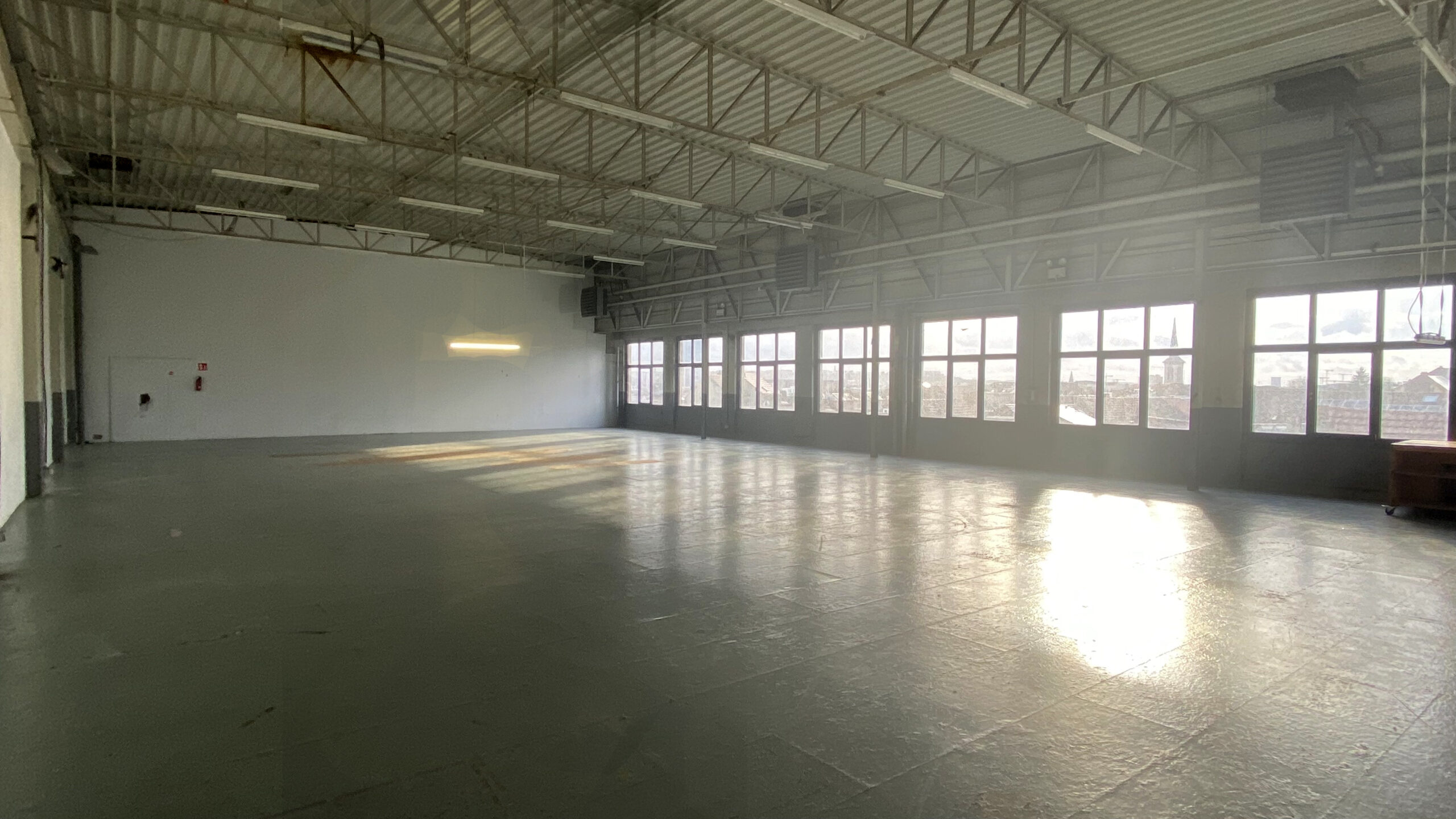
IMG_0750
With us an end
by caterina daniela mora jara
(excerpt from The Annex, Research Center Cycle IV)
“It is of the nature of the rule to desire the death of exception.” Jean-Luc Godard
From May 20 to July 26, 2023
Rotterdam, PAF, Brussels and Stockholm
Dear you:
These words are written with the knowledge the a.pass program will no longer exist. The end for the research program that a.pass was running for 15 years has come, and in your hands, you hold part of this end. It is the last annex of the Research Center, even though The Annex is not the end. It may seem dramatic, but do not forget that I grew up watching telenovelas in Fiske Menuco and Villarica, in the Argentinian and Chilean Patagonia, where I come from.
This letter is a sort of farewell to the Research Center Cycle IV and to a.pass, to which I’m part of, to where I belong. Therefore, the need for a farewell. But what is a farewell? Is it a space where we say, “Oh, goodbye, you have been so critical and helpful; we will miss you”? No, that’s silly on my part. I prefer to say: “With us an end.” A farewell in this case means that some people will lose their jobs, some books will no longer have a shelf, the rooms and offices that a.pass occupied will be empty. It’s crumbling around me right now, it is collapsing around us right now. Yet, we have to give an end to the format. It is not only sad, it is very exhausting and stressful. It is not only a pity, it is hard, it is a fuck you gesture with my finger on this paper, it is a wound because we are losing a space of discussion, a place that stores things of artists, personal stuff and professional stuff, an institution where credits are not determined by how much you read and how much you have demonstrated what you have learned. We lose an educational context in which there is no validation through grades, nor pass/fail course approval.
Read more..information
THANK YOU!!!!
22 December 2023
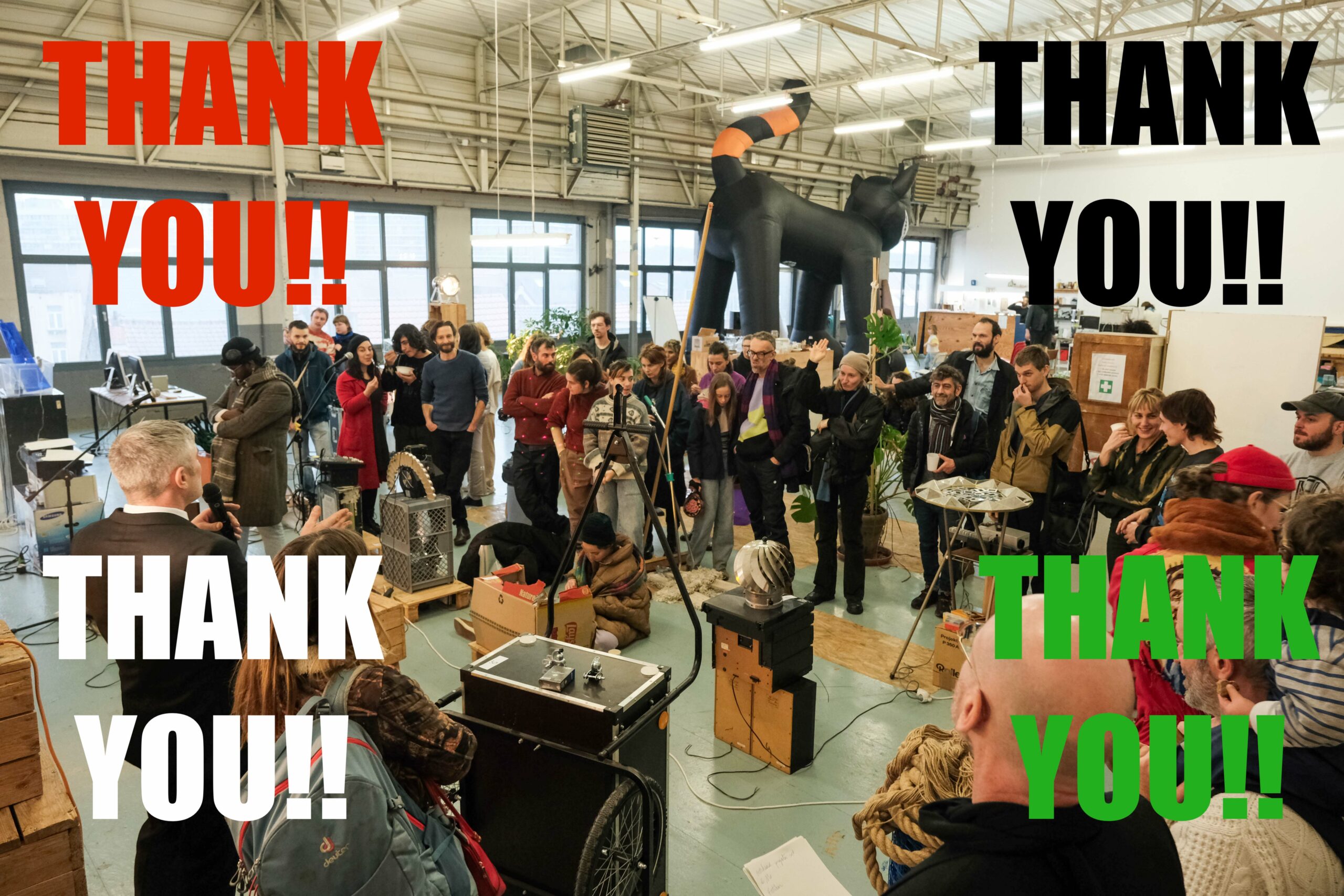
DSCF2746 (2)
THANK YOU ALL for being present at a.pass Clearance Sale on December 9.
It was a tremendous pleasure to see all of you and to celebrate together the ending of an era. The end of a.pass as we all know it. The auction was for us a very pleasant moment, a ritual to say goodbye, but also a moment to gather and to support the people in Palestine. As we mentioned before, all proceeds from the liquidation will be donated to aid relief efforts in Gaza. And we are very happy to announce that we collected €4.677,50 !!!
The money has already be transferred to the Cultural Emergency Fund of HOPE foundation, this fund offers many local artists and teachers the opportunity to support children who are suffering the consequences of war and destruction. More info: HOPE foundation
This wouldn’t have been possible of course without our excellent auction master Gary Farrelly, our special guest Elke Van Campenhout and the concept and scenography by Steven Jouwersma. And of course it wouldn’t have been possible without your presence and playing the auction game! THANK YOU!!
-, information
a.pass is looking for a new space
a.pass is at the moment in a transition fase, entering a period of reevaluation, reimagination, and ultimately reorganisation. At this moment we are using temporary spaces until September 2024. From September on we hope to find a new space. In case there are other organsiations looking for spaces, we would be happy to share space. All ideas are welcome!
information, project
a.pass Clearance Sale
9 December 2023 / a.pass
in support of Gaza relief, hosted by Gary Farrelly and special guest Elke Van Campenhout
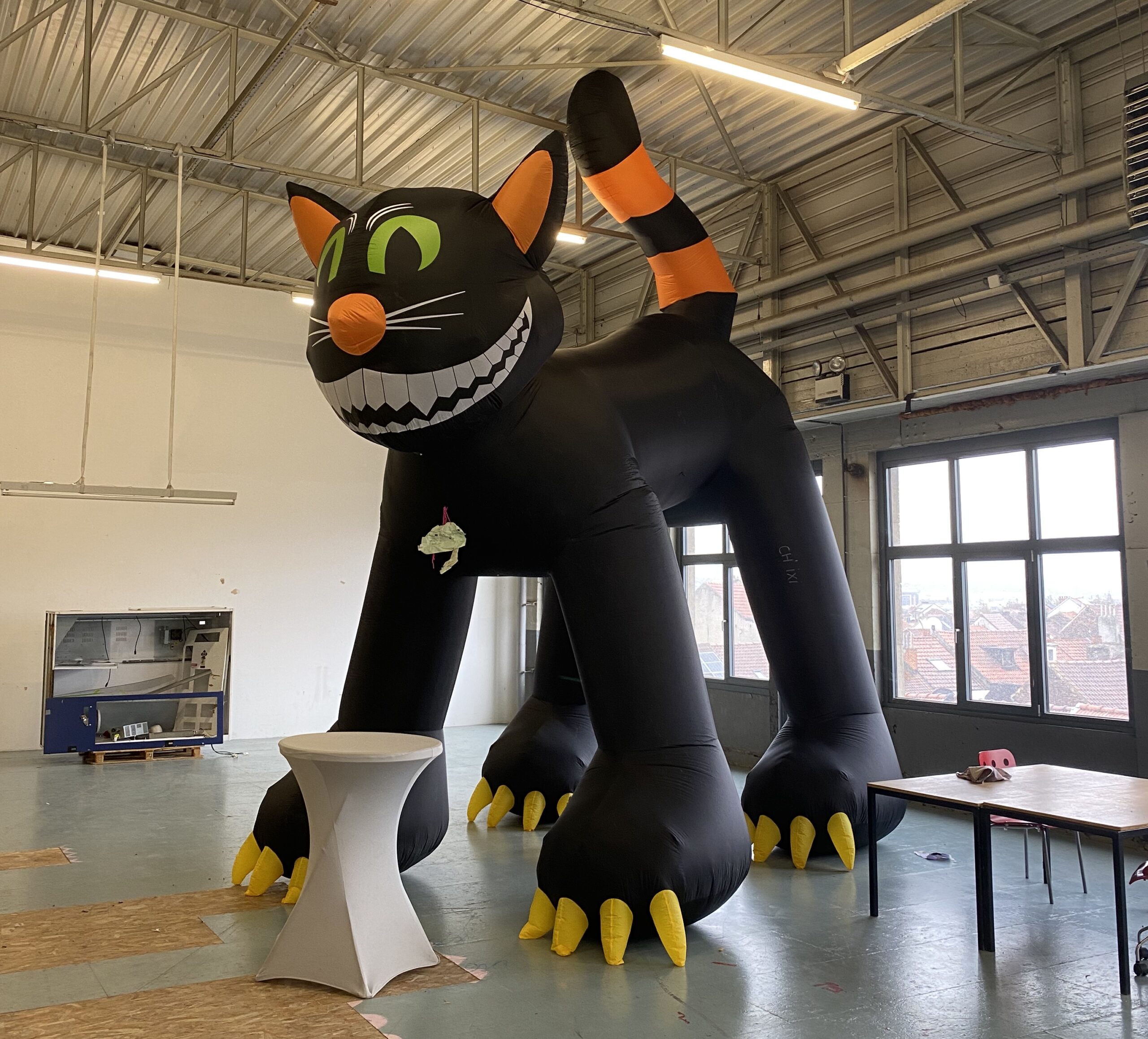
IMG_0360 2 kopie
December 9 – Doors open at 11:00 for viewing, auction sale starts at 13:00 – Delaunoystraat 58-60 ** There will be soup and drinks.
a.pass Clearance Sale
in support of Gaza relief
hosted by Gary Farrelly and special guest Elke Van Campenhout
a.pass is entering a period of reevaluation, reimagination, and ultimately reorganisation. As part of this process, the institution is liquidating an overwhelming abundance of materials accumulated over the years. Items available for purchase include furniture, fixtures, lighting, art, office supplies, props, cables, electronics, artifacts, curiosities, catering supplies, mystery materials, not to forget the dance floor and much more. The sale will take the form of a garage sale, with larger, high-value items going under the auction hammer. Gary Farrelly will oversee the sale together with special guest Elke Van Campenhout. All proceeds from the liquidation will be donated to aid relief efforts in Gaza. The Cultural Emergency Fund of HOPE foundation offers many local artists and teachers the opportunity to support children who are suffering the consequences of war and destruction. More info: HOPE foundation
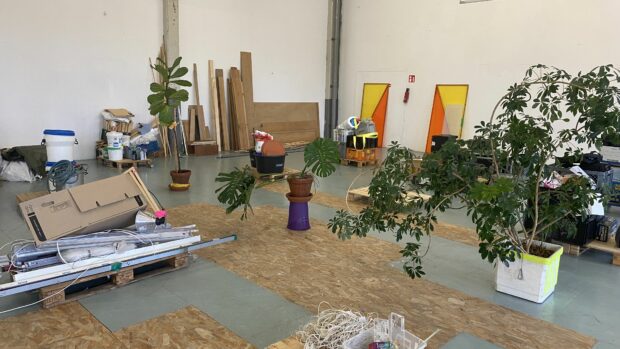
information, performative publishing, project
In these circumstances: On collaboration, performativity, self-organisation and transdisciplinarity in research-based practices
14 years of a.pass
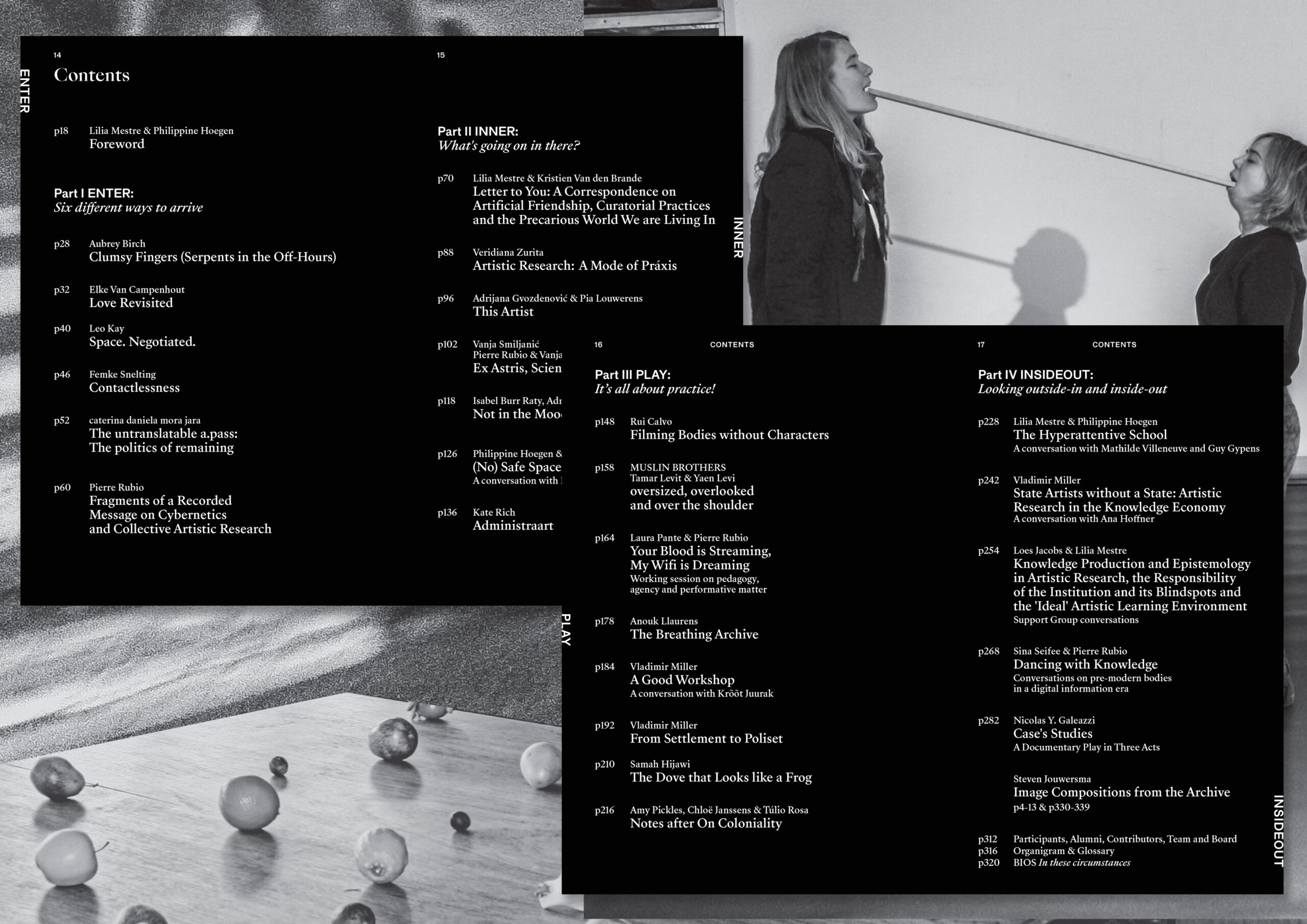
In these circumstances
In these circumstances: On collaboration, performativity, self-organisation and transdisciplinarity in research-based practices is a publication about artistic research as it is practiced within the co-learning environment of a.pass. This book brings together an assemblage of curatorial, artistic and pedagogical approaches emblematic of an institution that fosters collaboration, self-organisation and transdisciplinarity in research-based practices.
Read more..information, lecture, performative publishing, project, reading session
a.pass, Moussem, SOTA, Lagrange Points A global reading of the Gaza Monologues
29 November 2023 / The Whirling Ear - Kunstberg, 1000 Brussels
International Day of Solidarity with the Palestinian People
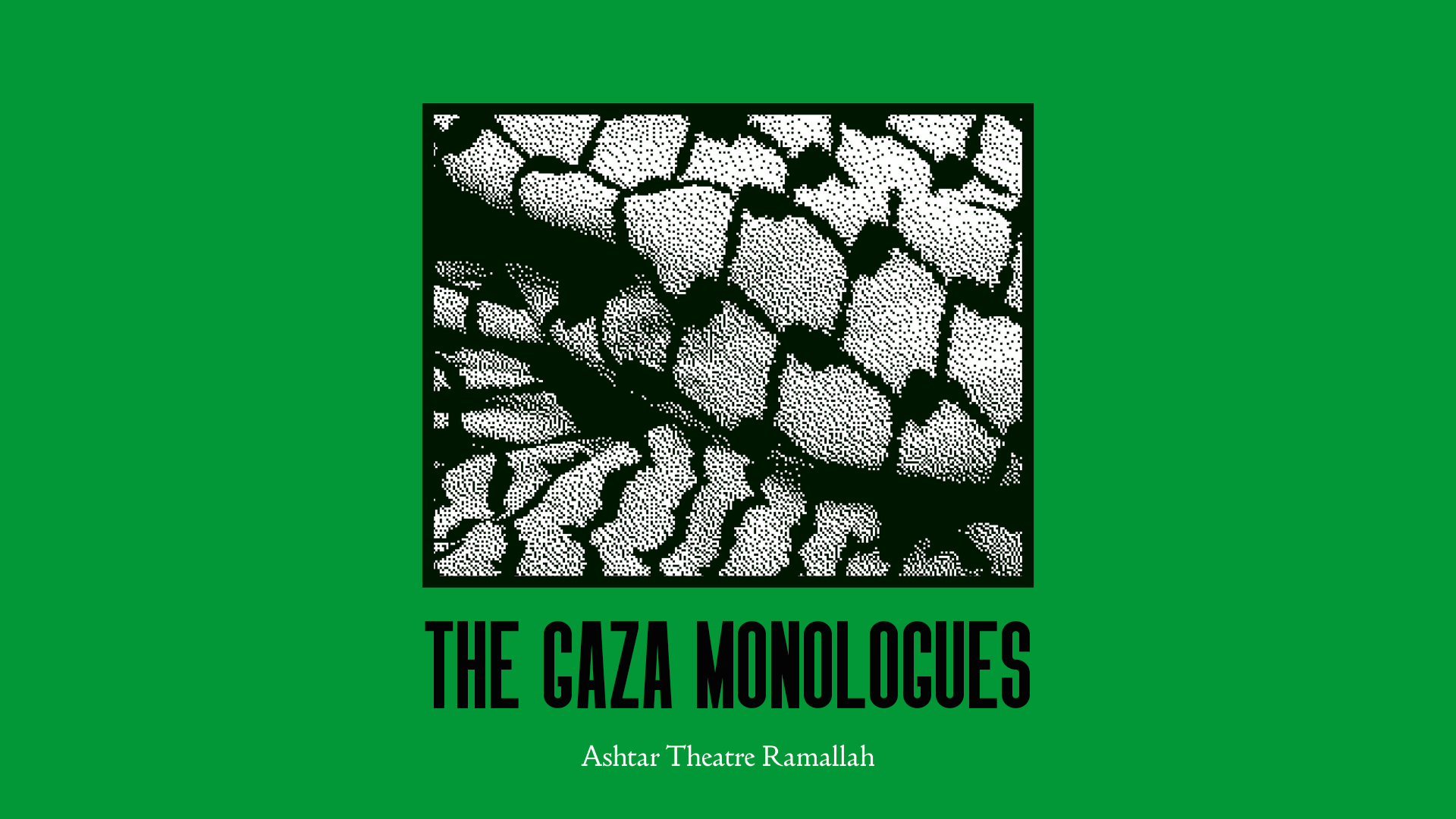
GAZA EN
The ASHTAR Theatre in Ramallah is calling on theatres and artistic organisations around the world to perform the Gaza Monologues on Wednesday 29 November and share images of the performances on social media. The play, produced by the Palestinian theatre company in 2010, consists of 31 testimonies from children and young people who lived through the war in Gaza in 2008 and 2009. In short monologues they recount what happened to them during those weeks. As the violence in Gaza has viciously erupted again, the text is as relevant today as it was 13 years ago.
The United Nations General Assembly has declared November 29 as the International Day of Solidarity with the Palestinian People. That is why ASHTAR Theatre is calling for the text to be performed again on that day.
Several cultural houses and many artists in Flanders and Brussels are responding to this call, as well as organisations in 40 other countries. Together with SOTA, Moussem and Lagrange points, a.pass will organise a reading of these monologues in different langues in the public space: at the statue of Godfrey of Bouillon in the heart of Brussels.
In exchange for the use of the text, a financial contribution will be made to ASHTAR Theatre’s fund, which is dedicated to the psychosocial well-being of Palestinian children and trauma therapy.
By reading these monologues, we want to express our solidartity with the Palestian people. Reading can give a voice to those unheard, provide a platform to the voices that are currently being silenced. We have read, heard and seen many testimonies of the victims of the brutal terrorist attack on 7.10.2023. We got to see their faces in the newspapers; on television, we heard their stories and got to know their families. And that is undoubtedly how it should be.
When it comes to Palestinians, however, we only hear numbers: 5.000 killed, 10.000 killed, 15.000 killed. Reading these 31 monologues is a call for putting a face and a voice to the thousands and thousands people, children, who lost their lives. Those that simply can’t remain unheard and unseen.
Wednesday November 29
15h-17h at The Whirling Ear Fountain
between Koningsplein/place Royale & Kunstberg/Mont des Arts 1000 Brussels
information, performative publishing
In these circumstances: On collaboration, performativity, self-organisation and transdisciplinarity in research-based practices
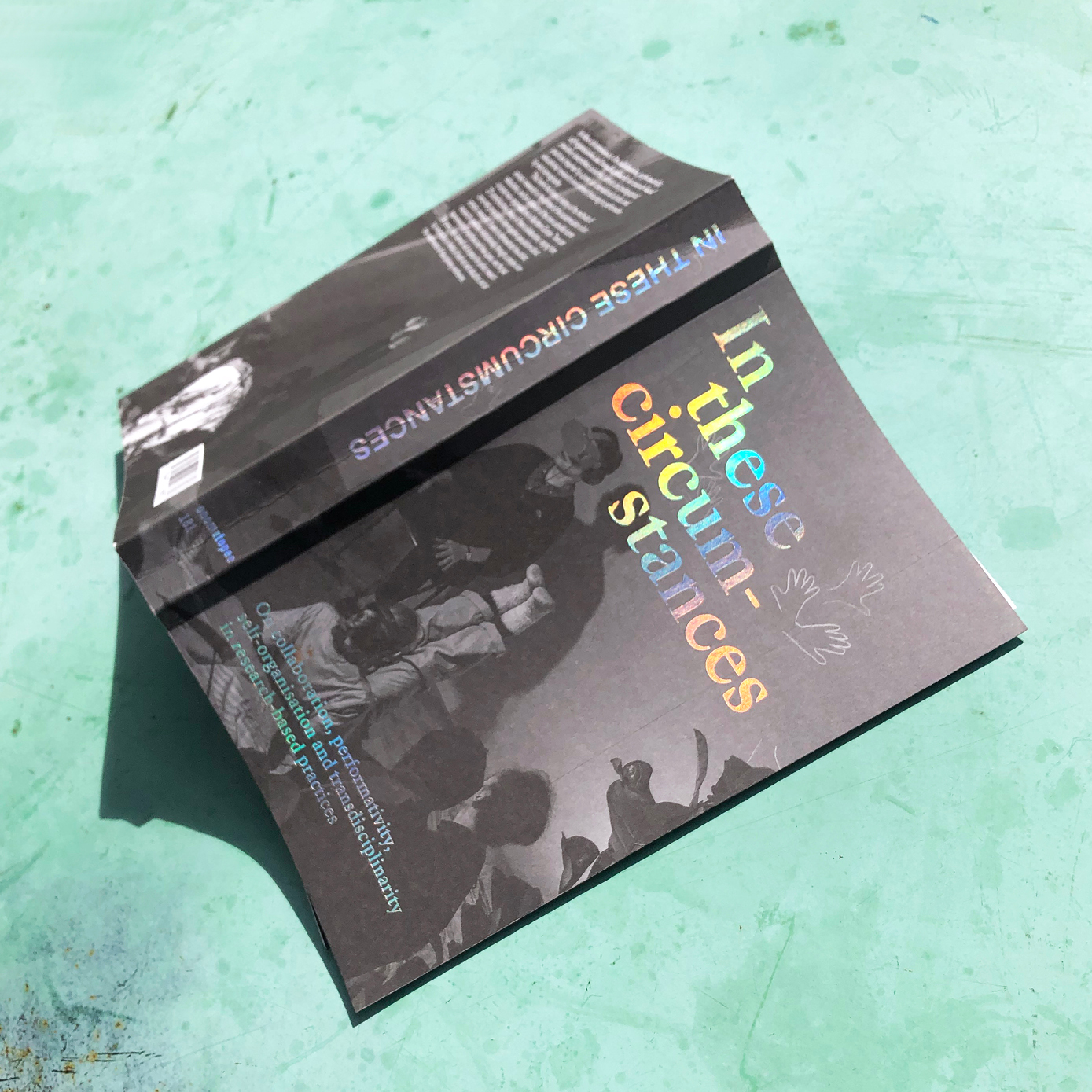
in_these_circumstances
In these circumstances: On collaboration, performativity, self-organisation and transdisciplinarity in research-based practices is a publication about artistic research as it is practiced within the co-learning environment of a.pass. This book brings together an assemblage of curatorial, artistic and pedagogical approaches emblematic of an institution that fosters collaboration, self-organisation and transdisciplinarity in research-based practices.
Read more..information
VACATURE administratief en financieel anker
administratief en financieel anker (60%)
m/v/x
a.pass is een artistieke onderzoeksomgeving die onderzoek ontwikkelt en ondersteunt naar performativiteit en scenografie, in een internationale artistieke en educatieve context.
Read more..information
Steven Port
asdasdasdasdjdsvjsv
vsdv
dsv
d
vdsv
dsv
dsvds
v
information
short bio
Lili Rampre
Lili M. Rampre is researching strategies to highlight “off stage”; processes, practices and actors behind, off, under or above the stage. Lili’s research is focusing on power relationships and the dynamics of disparities in cultural capital (audience-performer, fan-star, producer-artist). Her work has often a role-reversal in its core proposal, ventriloquism of a kind, or unreliable narration. She tends to work from community to make a portrait of dissensus (is there a community, is it real?, portrayal of the limits) and is despite her sociologically coloured interest not employing quantitative methods of humanistic studies concerning analysis of the interviews with the audience which could provide a look into the language that said audience uses when they address the question of dance, but rather looks at the language as a live form that is used in the circle of (its) practitioners – dancers, dance teachers, art researchers and such.
https://lilimrampre.cargo.site
conference, information, research center
Research Futures Public Debate
10 July 2020 / online
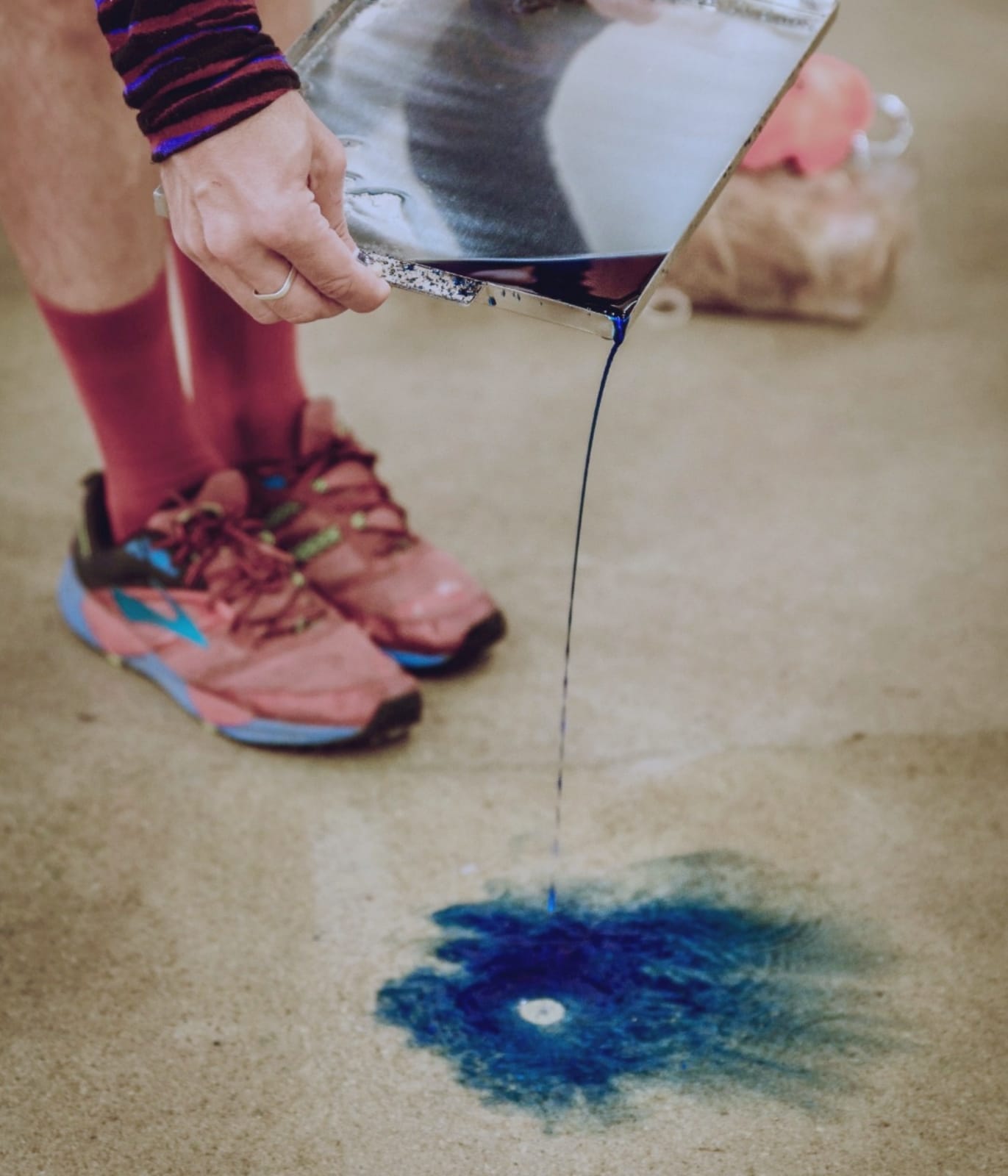
Research Futures
July 10th 2020, 14h-18h, online
a.pass cordially invites you to join the workshop presentations and public debate of the conference Research Futures on the 10th of July at 14h (online )
Read more..conference, information, research center
RESEARCH FUTURES
8-10 July 2020 / a.pass
Conference
The upcoming conference "Research Futures" will bring representatives from five institutions of artistic research together with professionals working in the field of education, arts, culture, artistic research, curation and activism to engage with a series of questions emerging from this comparative (self)-study. We want to understand better what is the range of educational and institutional strategies and practices operating in the field of artistic research today. Where do we see common struggles, pitfalls and current problematics with respect to our concerns with inclusivity, sustainable support structures, institutionalization of artistic research and politics of publication. And finally we would like to compare ourselves to the future: what are possible scenarios for artistic research to continue its contribution to the field of artistic production, and how can these contributions respond to the changing social realities of a challenging future?
Read more..information, postgraduate program
Workshops and Companions
The workshops of this block will be ‘gardens’ – and therefore for once of spacial nature. I propose to ask these gardens to be our teachers, to learn from them, to let them put us at work, to ask them to suggest a practice to us, to make them structure our time and our collective research attempts etc. The gardens are the ‘education’ framework and the ‘atelier.’
For this, we need interpreters and people who have tools, figures or behaviours to engage, read and work within the workshops. These interpreters – probably we will call them ‚companions’ – will build a network, a web of knowledge, together with us and amongst themselves. I would like to invite quite some of them to accompany us – sometimes alone sometimes in couples or groups.
For further details watch out for following posts.
information, postgraduate program
Three Days a Week
29 April-28 July 2019
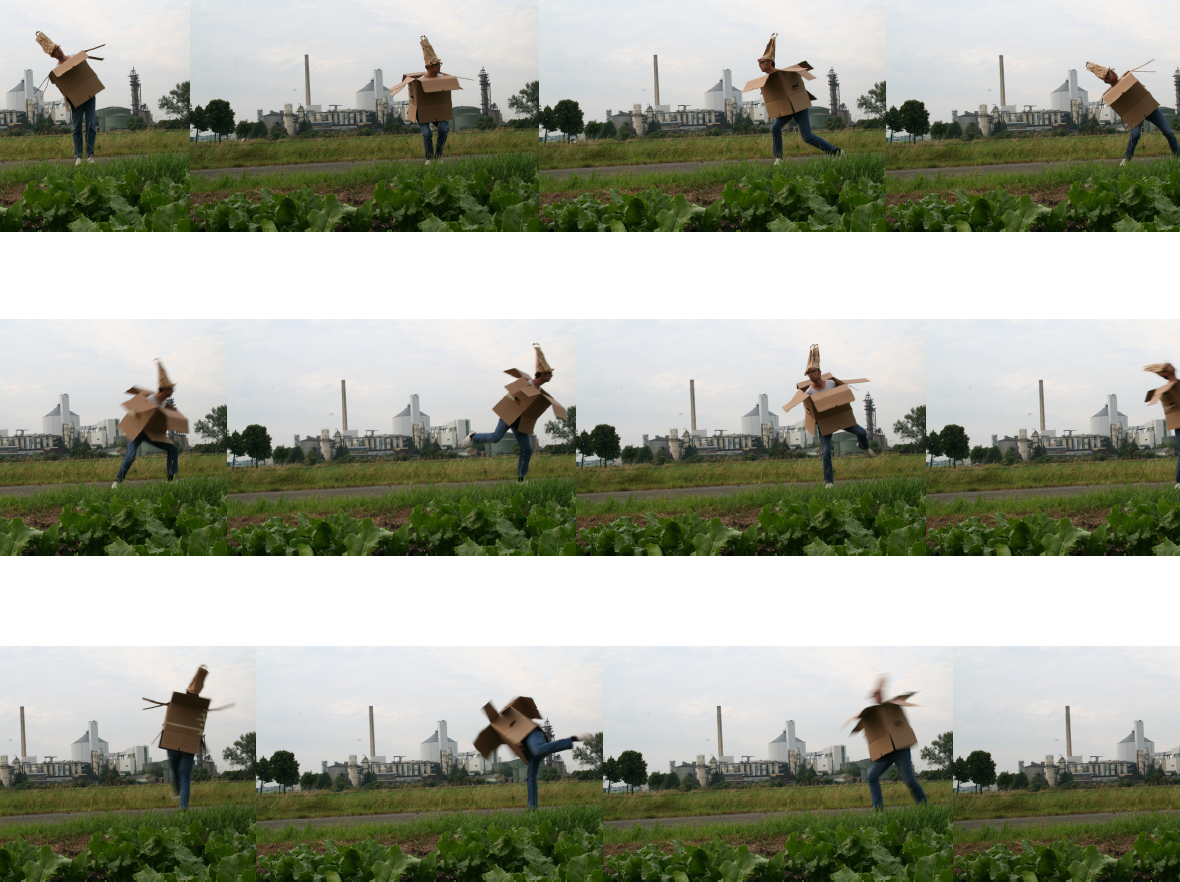
ö.
One day of relating to the environmental ecology by 'gardening'; one day of engaging giving seeds to the social ecology; and one day of diving into the mental ecology by composting the urgent knowledge.
Read more..information, postgraduate program
Settlement 14 schedule
7-26 January 2019
MON 7th
14:00 meeting
17:00 cleaning, emptying the collective space
19:00 dinner
TUE 8th
10:00 Materials and Tools
Read more..information
Agenda
information, project
17 April-1 May 2025
Location Birminghamstraat 30
BARULLO de HOJAS
information, postgraduate program
Nicolas Galeazzi Block overview
8 January-1 April 2018
plenum & forum
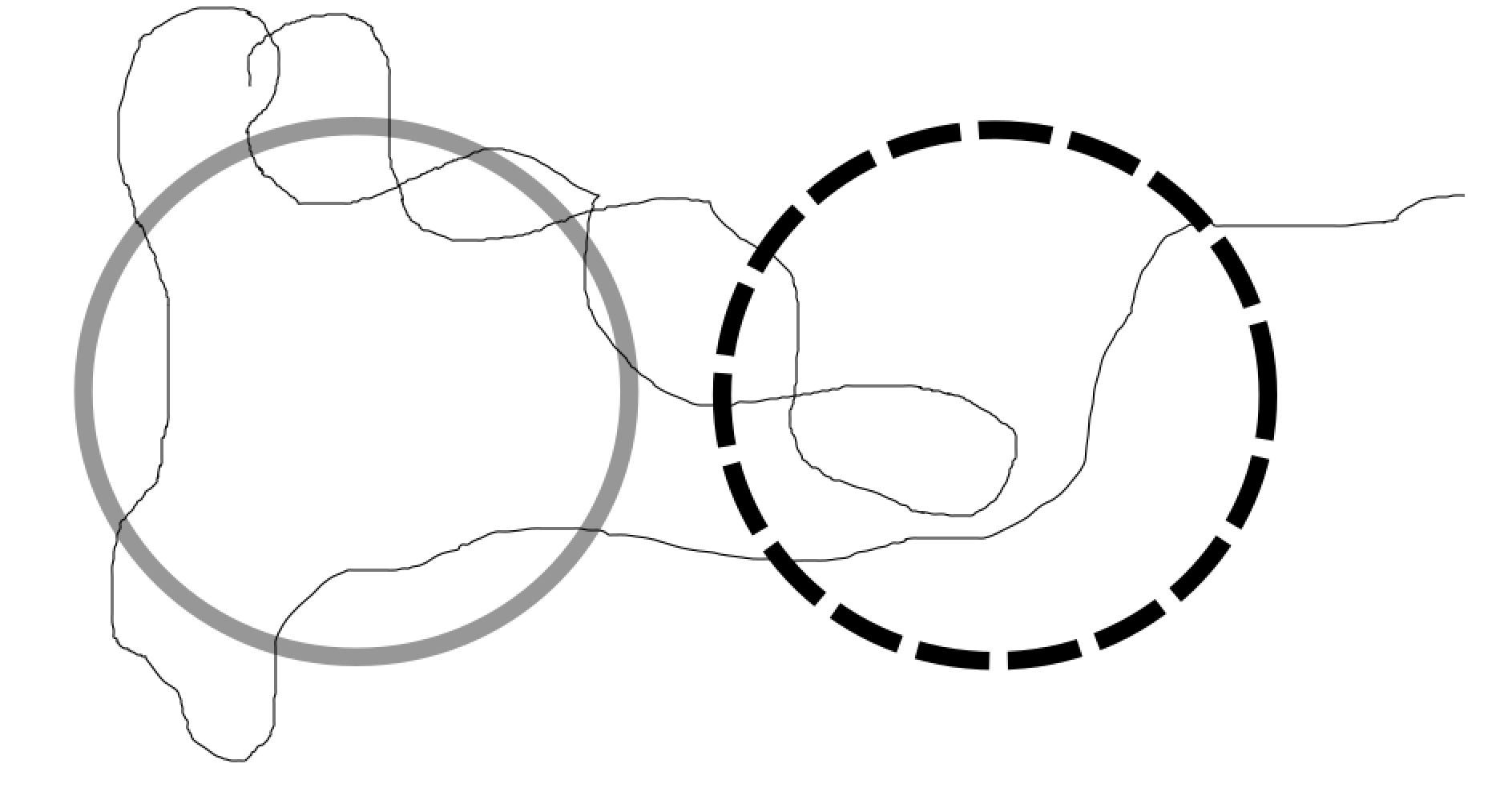
Fora&Plena
This post gives a sort overview over the organisation and schedule of the block 2018/I
Read more..information
Documentation Handpad
2004-2010
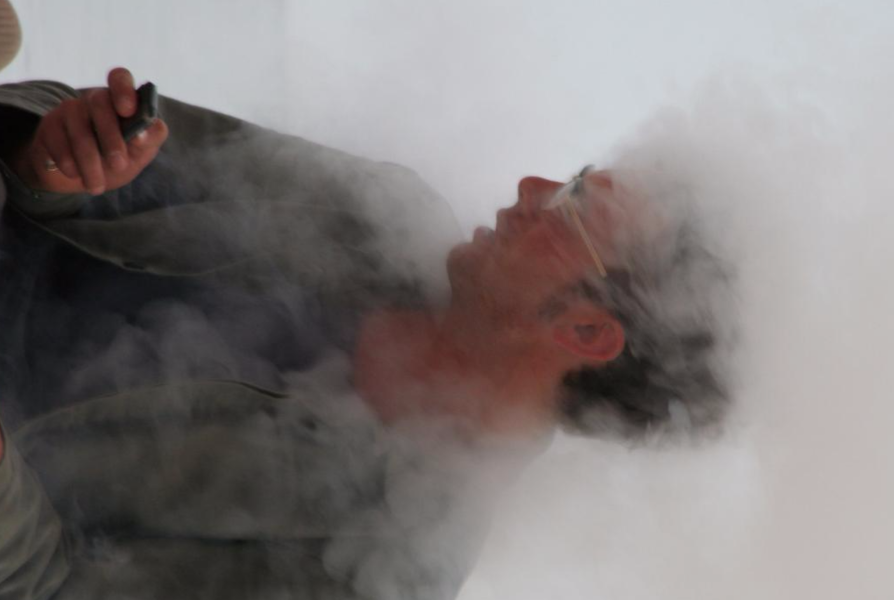
Bildschirmfoto 2017-02-06 um 10.52.19
Featuring collective works with GASTSTUBE°performance and Berlin n@work as well as solo practices.
Read more..information
newsletter2 september 2017
21-23 September 2017
An invitation to us visitors to temporarily observe and intentionally touch that ground we continuously step on. Landings brings together 7 a.pass researchers that started and finished their Post Master program at the same time.
Read more..information
newsletter1
21-23 September 2017
An invitation to us visitors to temporarily observe and intentionally touch that ground we continuously step on. Landings brings together 7 a.pass researchers that started and finished their Post Master program at the same time.
Read more..information, postgraduate program
Self-Interview & Peer-to-Peer mentoring
1 May-31 July 2015
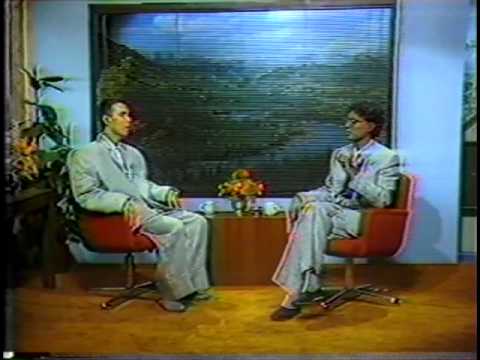
self interview
SELF / Throughout the block we develop a self-interviewing practice.
PEER / On top of the dedicated mentoring and the self-interview practice you will also mentor - and be mentored by -a peer researcher.
Read more..information
Outline of the current block
9 January-30 April 2017
informations about the organisation and content of the current block here Block I:2017_Skeleton outline
information
Opening Days
9-20 January 2017 / a.pass
Presentations of everybody’s state of research.
Presentation of the Research Center.
Presentation of a.pass as institution.
Presentation and practice of collective tools (website, administration, personal budgets…)
Presentation of the curatorial principles of the current block.
Read more..information
End Week Days
1-6 April 2017 / a.pass
The End Week Days are the last dedicated moments in the block for presenting our researches.
Read more..information
Assemblies, Mentoring, Workshops, Ateliers
9 January-30 April 2017 / a.pass
This four months block gives you the opportunity to develop your research individually and collectively.
The schedule is divided between mandatory days (30% of the time) as well as optional dispositives for you to compose as you wish what seems right for you and your research.
Read more..information
half-way days
20-24 February 2017 / a.pass
The half-way-days are the second assembly gathering in each block.
Read more..information, postgraduate program
Opening week Block II/2016
2-11 May 2016 / a.pass
Open up your practice to the others!
Read more..information, postgraduate program
MENTORING STRATEGIES Block III/2016
5 September-4 December 2016
The dedicated mentors for this block are Femke Snelting, Kate Rich, Geert Opsomer and Philippine Hoegen.
According to your needs, you can choose for either 2 or 3 mentors.
In order to challenge you with a specific context and language of mentoring we would like to suggest for this block, that the team of mentors proposes one of those 2 or 3 mentors to you. We would like to experiment with this possibly confronting, contrasting, or specific support to your research. With each of the 2 or 3 mentors you will have 4 hours of mentoring throughout the block.
Since the dedicated mentors will present themselves in the opening week and will attend all your presentations you will be able to decide on your mentors at the end of the first week.
To subscribe read more:
Read more..information, postgraduate program
Lilia Mestre Block Focus: Sub -(e)ject
4 January-31 March 2016 / a.pass
The relation between writing and performance

maxresdefault
The proposal for this block follows up on scores as a tool to organize dialogical or intersubjective formats for exchange in artistic practice and research. In the past two years I developed in the frame of a.pass a score for writing practice, ‘Writing Scores’ and a score for performance ‘Perform Back Score’, both as discursive tools. Both scores created a platform for the different researches to co-habitate and to reflect back the methods and strategies each of us use in the making and thinking of our practices. The main questions are: How do we compose materials and thoughts? What is the performativity at stake on the sharing of those? What’s the relation between subjectivity and collectivity in a collaborative environment? What does that do to our individual practices and to the collective itself?
Read more..information
CONTACT LIST
Find here the contact list of all participants, mentors and team members of the current and past blocks.
Please keep it updated with the personal information you want to share.
information
call
for artistic research PROPOSALS
Due to the Ministry’s decision we have to put the Intakes on hold until further notice.
Thanks for your interest in a.pass!
Read more..information, postgraduate program
HALF-WAY-DAYS
17-21 October 2016 / a.pass
Practice your practice with the others!
Read more..information, postgraduate program
MENTORING STRATEGIES block 2015/III
1 September 2015
the new structure for dedicated mentorings and the interview sessions
Read more..

